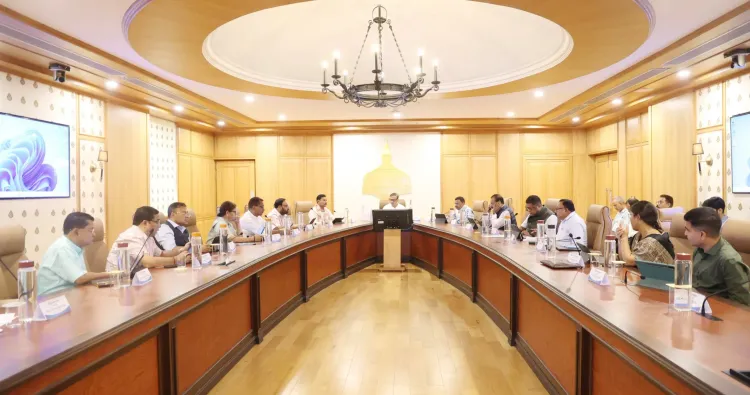What is the new Shradhanjali scheme announced by CM Himanta Biswa Sarma?

Synopsis
Key Takeaways
- The Shradhanjali scheme aims for dignified repatriation of deceased Assamese residents.
- A focus on marginalized communities, including the Rabha and transgender groups.
- Environmental conservation measures for wetlands in Goalpara district.
- Economic initiatives include the Assam Industrial and Green Growth Fund.
- Support for low-income workers and welfare measures for educators and health workers.
Guwahati, June 22 (NationPress) In a groundbreaking policy initiative, the Assam Cabinet, under the leadership of Chief Minister Himanta Biswa Sarma, convened on Sunday to ratify a series of pivotal resolutions aimed at advancing social welfare, enhancing environmental protection, reforming administrative structures, and fostering economic growth.
In his address to the press following the meeting, CM Sarma emphasized the cabinet’s dedication to promoting inclusive development and ensuring dignified governance.
Among the key resolutions was the endorsement of the ‘Shradhanjali’ scheme, designed to facilitate the respectful and coordinated repatriation of deceased individuals from Assam who pass away in other states.
Scheduled to commence from October 1, 2025, the scheme is primarily aimed at supporting low-income workers and those who die due to accidents or criminal acts outside Assam. The Assam Police Special Branch will serve as the nodal agency, supervised by a DIG-level officer to oversee its implementation. A dedicated social media channel and helpline (112) will ensure timely communication for families of the deceased.
In a bid to empower the Rabha community, the Cabinet approved the establishment of the Rabha Development Council for Rabha individuals residing outside the Rabha Hasong Autonomous Council (RHAC) area, tasked with executing welfare programs focused on the community’s socio-economic and cultural advancement.
The Cabinet also made a historic move to classify the transgender community as Socially and Educationally Backward Classes (SEBC), aligning with directives from the Supreme Court. Applicants for Transgender Identity Cards must provide proof of being original inhabitants of Assam, with District Commissioners assigned to verify and issue these cards. Environmental conservation was a focal point, with two significant wetlands in Goalpara district—Urpad Beel (1256 hectares) and Hasila Beel (245 hectares)—designated as Proposed Reserve Forests (PRFs) under the Assam Forest Regulation, 1891. The public will have a month to submit any objections or suggestions regarding the notification for Hasila Beel.
Additionally, the Cabinet prioritized welfare initiatives, approving an increase in the honorarium for Cook-cum-Helpers under the PM POSHAN scheme from Rs 500 to Rs 1,000 per month, resulting in a total monthly honorarium of Rs 2,000 starting in October this year. In the education sector, newly appointed teachers through the Special Recruitment Drive will receive their first annual increment in July 2025, expediting the timeline by an entire year.
To enhance employment opportunities, it was decided that 50% of the Supervisor posts in the Women and Child Development Department will be reserved for experienced Anganwadi Workers, while the remaining positions will be filled through direct recruitment.
In support of housing and transportation, the government extended its flagship ‘Apon Ghar’ and ‘Apon Bahan’ schemes to regular and eligible contractual employees in five major PSUs and societies, including the National Health Mission and Samagra Shiksha Axom.
On the industrial front, the Cabinet sanctioned the Assam State Mineral Exploration Trust Rules, 2025, to regulate and promote the sustainable exploration of minor minerals.
In a significant development in energy infrastructure, Hinduja Renewables was allocated land in West Karbi Anglong for a 900 MW pumped storage project, involving an investment of Rs 5,400 crore—crucial for advancing Assam’s renewable energy objectives. Furthermore, the Cabinet approved the transfer of 40 bighas of government land for the establishment of a Jawahar Navodaya Vidyalaya in Chandrapur, Kamrup (Metro), aimed at improving access to quality education.
Lastly, the state plans to establish a Rs 3,000 crore Assam Industrial and Green Growth Fund, anchored with Rs 500 crore, to support renewable energy, agro-tech, tourism, and start-ups, positioning Assam as a pivotal player in sustainable and green economic development.






